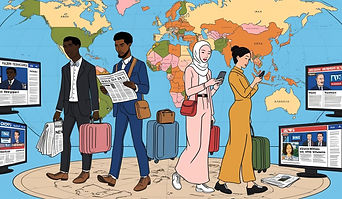
Research Projects
In this section we feature academic research that explores the intricate and sometimes conflicting aspects of how migrants engage with technology. Here, we celebrate the spirit of collaborative knowledge production, showcasing projects that embody interdisciplinary synergy and innovative thinking. Our platform welcomes the insights of early-career scholars and established researchers as well, offering fresh perspectives and advancing the scholarly conversation on migration and technology.
The research projects presented here are independently conceived, conducted, and owned by the scholars themselves. Translocal Lives acts solely as a platform for amplifying their work.

July — Dec, 2021
Digital Leisure Divide and the Forcibly Displaced
By: Amanda Alencar and Payal Arora
The importance of recognizing and understanding the digital leisure activities of forcibly displaced populations, often overlooked in research focused on utility-driven ends, is crucial for creating meaningful humanitarian interventions and ensuring accurate narratives about these communities.
Key words: Digital leisure, forced displaced, refugees, technology, participatory filmmaking

Sept — Oct, 2019
Digital Refugee Livelihoods
By: Julia Camargo and Amanda Alencar
This project aims to advance theoretical understandings of power differentials that are embodied in the use of technologies to promote livelihoods and financial inclusion for refugees. It involves a combination of fieldwork observations, interviews and focus groups to examine technology adoption by Venezuelan women refugees and humanitarian actors in the context of a digital work program in the city of Boa Vista (Brazil).
Key words: Digital work, Digital economy, Refugee livelihoods, Women refugees, Humanitarian agencies

Ongoing
Settling through media
By: Camila Melícia Valgas
The Netherlands has become a dynamic migration society, and active policies to facilitate immigrants' adaptation to Dutch society are needed. Traditionally, journalism fosters shared understanding among citizens, being vital for cultural adaptation. This PhD aims therefore to understand how immigrants consume news and the effects of news consumption on acculturation.
Key words: Immigrant; news consumption; acculturation; cultural adaptation; immigration.

Jan — Dec, 2023
Becoming a Rotterdammer
By: Roel Lutkenhaus
What does it mean for a newcomer 'to thrive'? Is it having a home, a meaningful job, lots of friends? When newcomers feel like they belong in a city, they will feel more at home and their well-being and participation will increase. Through Becoming a Rotterdammer, we seek newcomers who excel in belonging, potentially discovering strategies that hasten their sense of home, which others can emulate.
Key words: Positive deviants, social media, newcomers, bottom-up innovation, action research

Apr, 2016 — Feb, 2020
Digital media and Haitian immigrants
By: Denise Cogo
The research project aims to analysis of counter-hegemonic narratives produced and shared in digital media by Haitian immigrants in Brazil during 2015 and 2017. The analysis demonstrates how these narratives evidence racism experienced by these immigrants residing in Brazil.
Key words: Activism; Digital media; Haitian immigration; Narratives; Racism, Brazil.

Ongoing
Hospitality as a Mediated Encounter
By: Yael Gordon
Since Russia's invasion of Ukraine in February 2022, over 6.74 million Ukrainians have fled, with 215,200 resettling in the UK through initiatives like the Ukraine Family and Sponsorship Schemes (Home Office, 2024). These schemes represent a shift in UK refugee policy, placing responsibility on private citizens to host refugees with financial support (Burrell, 2022). This research examines British hosts' perspectives on their encounters with Ukrainian refugees, initiated online via platforms like Facebook and transitioning into domestic spaces.
Key words: Ukrainian refugees; British hosts; hospitality; mediated encounter.

Ongoing
(De)constructing peace
By: David Ongenaert
This project examines how mediated peace discourses on the Russian-Ukrainian war are constructed and received. While media narratives shape public and political agendas, their production and impact remain underexplored. Using a multi-method approach, the study analyzes how key stakeholders shape and reinterpret these narratives across media platforms.
Key words: Mediated peace discourses, political communication, news production, media witnessing.

Oct, 2018 — Feb, 2019
Brazilians in Spain
By: Denise Cogo
The purpose of this project is to analyze the communication and transnational activism of Brazilian immigrants in Barcelona, Spain, which can be linked to the current context of economic and political crisis in Brazil, focusing on the collective actions of these immigrants against the impeachment of former President Dilma Rousseff.
Key words: Communication, Brazilian immigration, activism, politics, transnationality, social networks.

Ongoing
Anti-migration activism in Portugal
By: Lucas Arantes Zanetti
This project investigates the communicative dynamics of anti-immigration activism in Portugal, focusing particularly on the Brazilian migrant community, the largest foreign group in the country. In recent years, the intensification of Brazilian migration has coincided with the rise of far-right movements and the proliferation of xenophobic and racist discourses in the Portuguese public sphere. Against this backdrop, the research examines how digital platforms such as Telegram and X (formerly Twitter) function as arenas for the articulation, dissemination, and mobilization of anti-immigration narratives.
Key words: Migration; Anti-Immigration activism; Digital Platforms; Brazilian Diaspora; Hate Speech